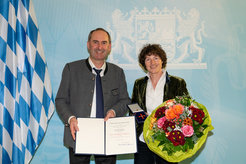Petra Schwille receives the Cross of Merit
Max Planck Director Petra Schwille receives the highest recognition of the Federal Republic of Germany for services in the interest of the common good for her research.
On November 15, 2023, Deputy Prime Minister Hubert Aiwanger awarded the Cross of Merit 1st Class of the Order of Merit of the Federal Republic of Germany to biophysicist and Director at the Max Planck Institute of Biochemistry, Prof. Dr. Petra Schwille. In her research department, Petra Schwille aims to create a simple biological system from individual, well-characterized building blocks that can reproduce itself - something that was first achieved by the primordial cell.
"Her scientific and methodological expertise as well as her tireless enthusiasm make Professor Schwille a pioneer in her field of research. In addition to numerous awards, including the Leibniz Prize of the German Research Foundation and the Philip Morris Research Prize, she has now also been awarded the Federal Cross of Merit 1st Class in recognition of her commitment," said Deputy Minister President Hubert Aiwanger.

The work of the Cellular and Molecular Biophysics research department
How did the first cells develop billions of years ago? And what components and abilities did they have? Only one thing is certain: they had a much simpler structure than today's organisms, which have had to constantly adapt over the past three to four billion years of evolution on Earth and have thus become increasingly complex as a result. Currently, even a minimal biological cell, which should only have the absolutely necessary components, with around 500 genes, is still too complex to recreate. For this reason, scientists in this field are concentrating on individual, essential properties of cells, such as their division. The current research goal of Petra Schwille's department is to build such a minimal biochemical system that divides autonomously and in a controlled manner into two daughter systems without external control.
The research team is focusing primarily on membrane vesicles, which are about the same size as our body cells but consist only of lipids, in other words the cellular envelopes, and contain a defined mixture of proteins that are supposed to trigger division. The team has already been able to get five different proteins, which originally come from a bacterium, to organize themselves in a vesicle in such a way, that a so-called division ring forms right in the middle and begins to deform the vesicle. This step is essential for cell division and brings the researchers one step closer to a minimal cell.
"I feel very honored that my work has been recognized in this way by the Federal Republic of Germany and am grateful for the trust and freedom of research, which I hope will enable me to contribute many more important and fundamental insights into the origin and properties of life to our current state of knowledge," says Petra Schwille, expressing her gratitude for the award.
About Petra Schwille
Petra Schwille studied physics and philosophy at the universities of Stuttgart and Göttingen and completed her doctorate under Nobel Prize winner Manfred Eigen at the Max Planck Institute (MPI) for Biophysical Chemistry. After a postdoctoral stay at Cornell University, Ithaca, New York, USA, she returned to Germany and the MPI for Biophysical Chemistry in 1999, where she headed her own research group. In 2002, she was appointed to the Chair of Biophysics at the Biotechnology Center (BIOTEC) of the Technical University of Dresden, which she held until April 2012. She has been Director at the MPI of Biochemistry since 2011 and heads the Cellular and Molecular Biophysics research department. She has also been an honorary professor at the Faculty of Physics at LMU since 2012. Petra Schwille has been awarded various prizes, including the Philip Morris Research Prize in 2004, the Gottfried Wilhelm Leibniz Prize 2010 from the German Research Foundation and the Bavarian Maximilian Order in 2018.
[tb]
Dictionary of the Department of Cellular and Molecular Biophysics:
Vesicle / Membrane vesicle: Vesicles are small bubbles in our cells that are surrounded by a membrane, in other words an envelope. Our cells mainly use them to transport certain substances.
Lipids: Lipids are biological molecules that are essential for us. They include, for example, fats, oils and waxes.
Minimal cell: A minimal cell is the idea of an artificial cell produced in the laboratory that contains only the absolutely necessary biological components to be viable. It is intended to imitate the presumed "primordial cell", the first living cell.










